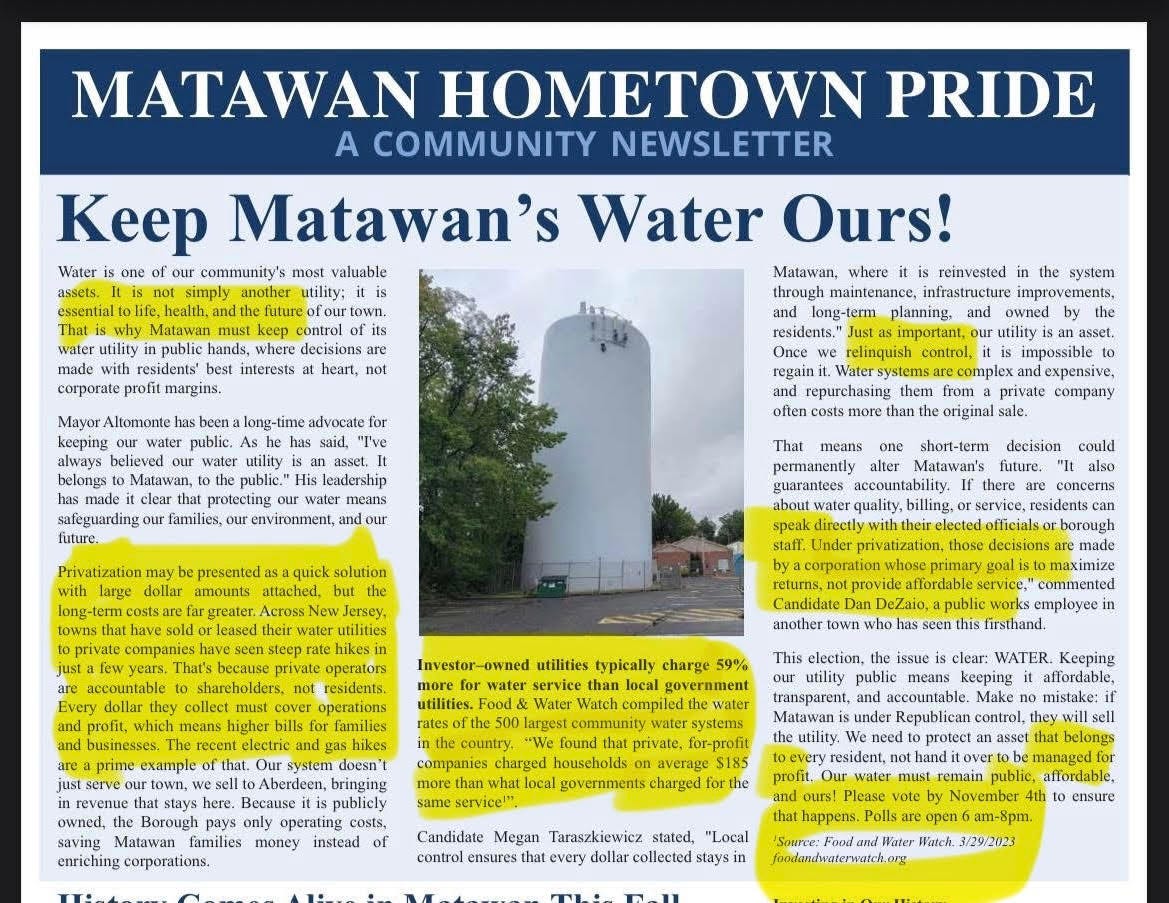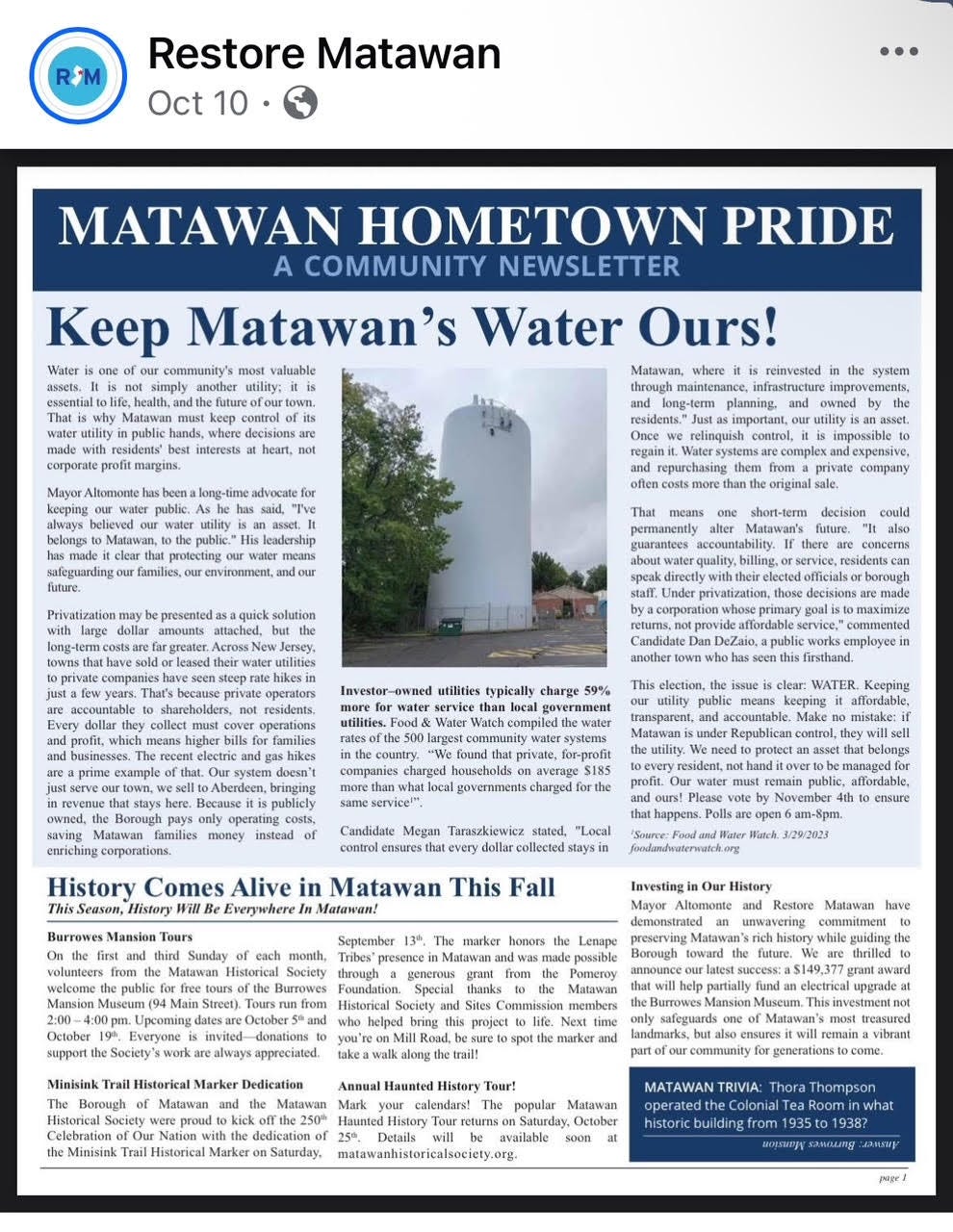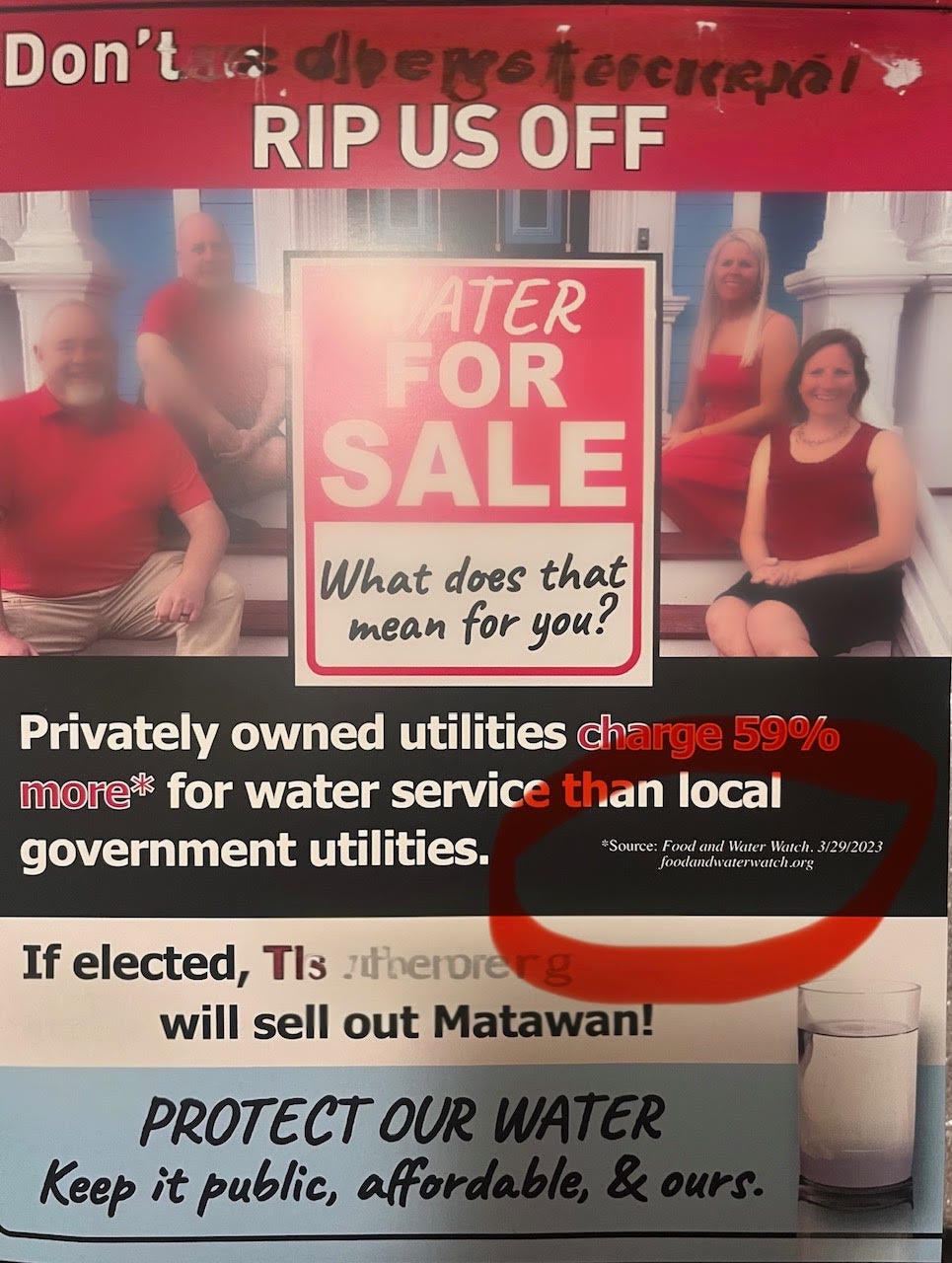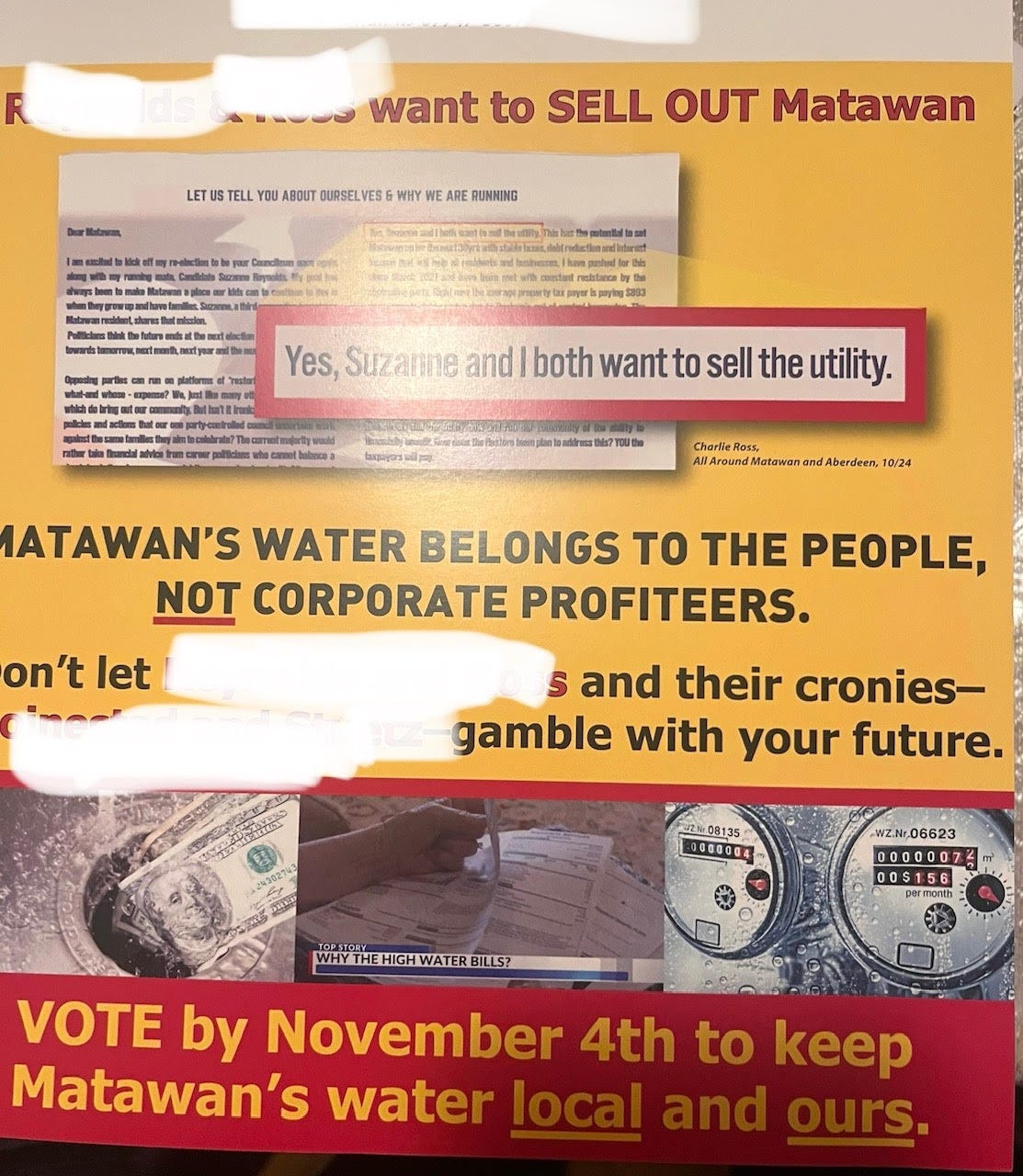Letter to the Editor: Who is REALLY "selling out" Matawan?
A Matawan resident shares their concerns regarding dark money infiltrating Matawan.
Dear Central Jersey Newswire,
As Matawan Borough grapples with the potential sale of its aging and financially burdensome water and sewer utility, a growing chorus of residents is raising alarms about shadowy outside influences seeking to derail what could be a historic financial windfall for taxpayers. At the center of the controversy: Food & Water Watch, a Washington, D.C.-based dark money lobbying firm notorious for pushing far-left, anti-corporate, and socialist agendas that prioritize ideological battles over local fiscal realities.
Residents of Matawan have observed a troubling pattern in the current Council Majority’s governance. Questionable tax breaks and deals for developers, such as the recent $85,000 reduction for the owner of 126 Main Street/Key Foods and the opaque circumstances that lead to the 160 Main Street “monstrosity” lawsuit and “forced” settlement just months ago, raise concerns. The Mayor and Council Majority attribute that decision to a mysterious “shadowy figure” exploiting Affordable Housing Mandates.
Coupled with their increasingly evident close ties to Food & Water Watch, residents are left questioning: Who is truly in control of Matawan?
What is Food & Water Watch? The latest interloper in this saga of questionable decisions.
In August 2025, the Council held a public hearing on submitting an application to the New Jersey Department of Environmental Protection (DEP) for Water Infrastructure Improvement Program (WIPA) approval. This key step would empower the Borough to negotiate the sale of its crumbling utility sustem for a premium price – far better than the constraints of a ballot referendum – potentially unlocking unprecedented benefits for taxpayers, infrastructure upgrades, and long-term fiscal relief. Yet, the proceedings were hijacked by aggressive opposition from an out-of-town agitator representing Food & Water Watch, who sought to override the will of local taxpayers and sow fear about corporate involvement.
Who was this obnoxious interloper, inflaming residents against a decision many support as a pragmatic path forward? And why is a national special-interest group so invested in blocking Matawan’s home-rule autonomy? The answers are emerging, and they’re troubling. Despite the Council’s unanimous vote to “explore all options” and advance the WIPA process, evidence now suggests the Majority has been quietly collaborating with Food & Water Watch to sabotage the sale entirely.
But why cling to a notorious money pit – a utility plagued by leaks, breakdowns, and escalating repair costs – when divesting could deliver a clear “win” for the Borough, slashing taxes and funding vital community needs for the first time in Matawan’s recent history?
The stakes couldn’t be higher. Matawan’s water and sewer systems are indisputably failing: outdated pipes burst regularly, treatment facilities lag behind modern standards, and ratepayers foot the bill for endless Band-Aid fixes. Selling to a regulated private operator isn’t about handing over control to “greedy corporations” – it’s about leveraging expertise and capital to modernize infrastructure while injecting millions into Borough coffers. Yet Food & Water Watch’s fearmongering campaign paints this as a dystopian handover, ignoring the real-world successes in nearby towns where similar transitions have stabilized services and reduced burdens on locals.
To understand the threat, we must examine Food & Water Watch’s shady history – a track record of misinformation, dark money opacity, and radical activism that masquerades as environmentalism while undermining energy security, scientific consensus, and community choice.(1)
Founded as a spin-off from Ralph Nader’s Public Citizen in 2005, the group has ballooned to a $14 million annual operation, but refuses to disclose the full sources behind its funding, fueling accusations of dark money manipulation.(2)
Critics, including the Center for Public Integrity, have exposed how FWW decries “dark money” in politics while funneling untraceable dollars into elections and advocacy, often through opaque networks that shield donors.(3)
FWW’s playbook is predictable: fabricate facts to scare communities into submission. They’ve been slammed for peddling bogus claims about hydraulic fracturing (fracking) to ban a vital domestic energy source, funding astroturf local groups with foundation cash to simulate grassroots outrage.(3)
In 2017, they launched a secretive $14 million ad blitz in New York to kill clean nuclear energy subsidies, bankrolled by undisclosed funders intent on sabotaging reliable power in favor of weather-dependent renewables.(4)
More recently, they’ve opposed hydrogen fuel cells – a promising clean technology – in favor of resource-intensive battery storage, drawing fire for spreading FUD (fear, uncertainty, doubt) while soliciting donations.(5)
Politically, FWW is a far-left powerhouse. Rated “left biased” with “mixed” factual reporting by Media Bias/Fact Check for rejecting scientific consensus on GMOs, pesticides, and energy, they advocate total bans on fracking, nuclear, and conventional agriculture in pursuit of a 100% renewable utopia that ignores economic fallout.(5)
Their 501(c)(4) arm, Food & Water Action, endorses progressive candidates, lobbies for socialist-leaning policies like shutting down factory farms and ending “corporate control” of essentials, and has poured over $64,000 into 2023 campaigns alone.(6) Board member Maude Barlow, the self-styled “Water Czar” with no scientific credentials, advises the UN on hydrology while FWW sues the EPA and spreads anti-biotech hysteria.(7) They’ve even been accused of conning taxpayers by exploiting charitable loopholes for political warfare.(8)
In New Jersey, FWW’s anti-privatization crusade has meddled in local decisions, from Gloucester Township’s $143 million wastewater sale to battles in Allendale and South Orange, where they’ve hyped rate hikes while ignoring public systems’ failures.(9)
Now, they’re targeting Matawan, agitating against a WIPA process that empowers negotiation over knee-jerk referendums – all to preserve a “public” utility that’s anything but: a crumbling liability draining Borough resources.
How do we know the Mayor’s Majority Is playing footsie with Food and Water Watch to fear monger in spite of voting unanimously to move forward? They admit it in Social media posts.
(Continued below)
It now appears FWW is not merely seeking to interfere with Matawan resident’s local decision making autonomy. They are seeking to rig the outcome of the Borough Council elections in THEIR favor by working hand and hand with the Council Majority.
Residents deserve transparency. Why is the Council cozying up to this out-of-state radical outfit? What hidden agendas are at play, and who benefits from keeping Matawan shackled to a failing system? The special deal for Developers, including the 160 Main Street settlement already exposed a pattern of deference to unseen forces – is Food & Water Watch the latest puppet master?
Matawan taxpayers built this town through hard work and common sense, not D.C. dogma. It’s time to demand a full accounting: no more shadowy deals, no more fear tactics. An ever increasing number of residents support exploring our options through the WIPA process.
Residents of Matawan need to reclaim control and ask the tough question: *Who is REALLY selling out Matawan? *
Sources utilized:
(1) http://environmentalprogress.org
(2) http://environmentalprogress.org
(3) http://publicintegrity.org
(4) http://activistfacts.com
(5) http://biggreenradicals.com
(6) http://reddit.com
(7) http://mediabiasfactcheck.com
(8) http://influencewatch.org
(9) http://activistfacts.com
(10) http://naturalgasnow.org
_________________________________
Want more CJN? Make sure to follow us on our respective social media platforms. If you’re interested in joining the team, have questions about advertising, or want to send hate mail, message us here on Substack.






